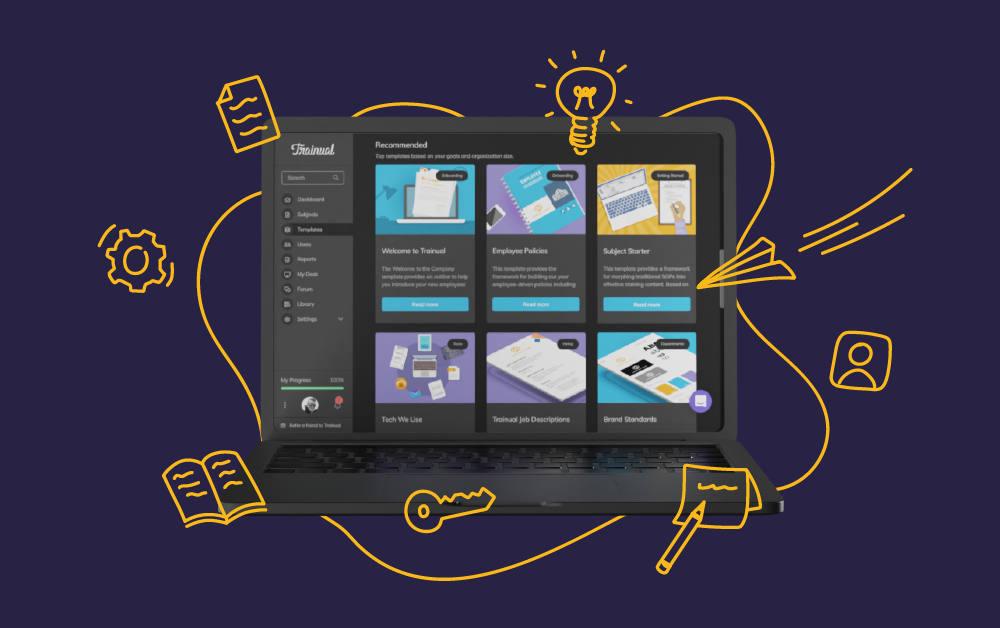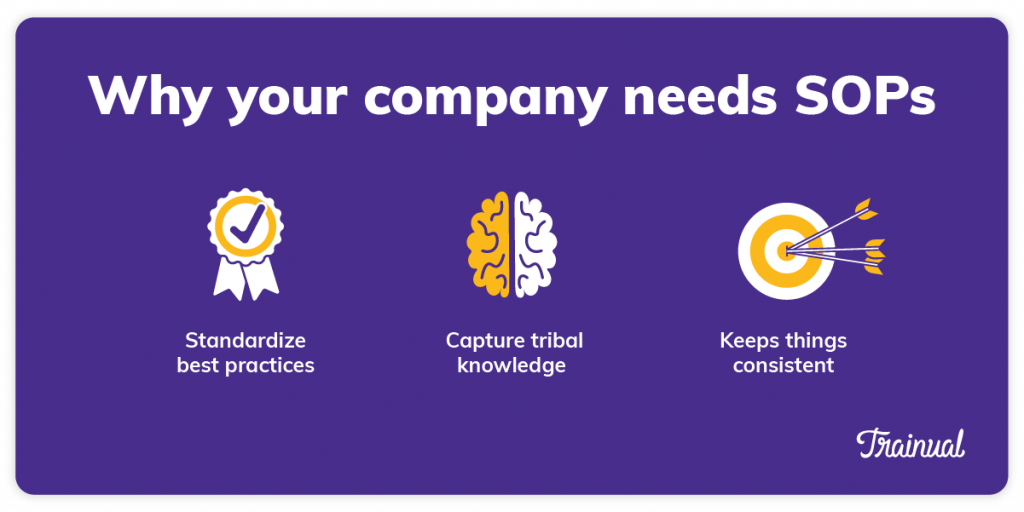
Articles
Why Your Team Needs A Small Business Wiki
March 24, 2021

Say goodbye to wasting hours, searching for answers that could be anywhere. And instead, get those answers in seconds - with a small business wiki. AKA a centralized, searchable place for all your company's knowledge.
Here's how:
What is a small business wiki?
A small business wiki is an online database for all of your company's internal knowledge. Meaning, it organizes all your tribal knowledge, policies, and SOPs in one centralized platform.
And it acts like your company's in-house search engine. Meaning, when someone on your team has a question, they can simply look up the answer in your small business wiki. And the answer pulls up in seconds. (Fun fact: "wiki" is a Hawaiian word that literally means quick).
Plus, it's built, edited, and managed by your team. So, documenting your business and keeping that documentation up to date doesn't fall on one person (a-hem, you).
Instead, everyone can own their part. Such that the social media manager will document all your company's social media policies and procedures. And anyone else who's tapped in to help can easily see how they do it - and do it that way too.
We like to think of it like Wikipedia, the crowd-sourced encyclopedia with a whopping 6.2 million articles. But instead of focusing on every topic in the world, it only focuses on your small business. What you do, how you do it, and who does what included.
Why you need a wiki for small business
Plainly put, a small business wiki makes running your small business easier. That's because every company needs to document their business to standardize it. No exceptions. And a wiki offers a searchable, centralized place to put all that documentation.
That way, it's easily accessible for everyone on your team that needs it. And instead of wasting time and guessing the right way to do something, they're empowered to look it up.
Without a wiki, the average employee spends 25% of their time searching for the information they need to do their jobs. And this lost productivity costs companies roughly $4,000 per employee each month.
And there's not a ton that you can do about it because the information is all over the place. Or worse, the process isn't written down at all - so you have to ask around and hope you get the right answer. It's total chaos!
Plus, when you put all your company's knowledge into your small business wiki, you naturally create a better onboarding and training experience. With it, employees can go at their own speed, so they'll retain more.
And if your team members ever forget something (they will), it’s no big deal. Because they can look it up on demand - and know exactly where to find the answer (AKA in your small business wiki). No time wasted.
👉 Trainual is the top-rated wiki software trusted by thousands of growing small businesses. Try for free.
Who should create the wiki?
Typically, your CEO, head of People Ops, or whoever is responsible for your company's training will create the bones for your small business wiki. Meaning, whatever software you choose to use, they'll set it up for your company and start inviting your team members.
But like Wikipedia, building all the content should be a team effort. Ask each of your employees to document their responsibilities. And only what they do.
After all, it doesn't make sense to have your People Ops team documenting how to support your customers because they don't do it themselves.
If you have multiple people roles, have your top player own the documentation. Then, ask everyone else in that role to check their work and add their best practices.
But by getting everyone to own their part, you can build your small business wiki way faster. And getting everything documented doesn't feel like mission impossible.
Plus, you guarantee that you're documenting the way things are actually done - not how they ideally should be done. This gives you a better idea of where your business processes really are and how you can improve them moving forward (AKA a huge win).
🔥 Tip: Within Trainual, clearly delegate who should document what with the subject owner feature. That way, you can hold people accountable and ensure everything gets documented. Try for free.
How to create your small business wiki
Admittedly, building your small business wiki is a lot of heavy lifting upfront. But an hour of work now saves your company 10 hours later (and that's a conservative number).
Plus, you don't have to be the person who puts in all the work (in fact, you shouldn't be). Here's how you easily build your small business wiki:
Pick your wiki software
Not all wiki software is created equal. And choosing the right one can be a bit overwhelming if you don't know what you need.
So, here's a list of all the non-negotiable features a small business wiki needs to have:
- Intuitive content creator. Duh! Creating content is the bread and butter of a small business wiki. And if it's not intuitive, your team won't bother contributing. It's just a fact.
- Powerful search logic. You need to be able to find the exact information you're looking for with one keyword search. Otherwise, you'll end up wasting more time looking for information than you're saving.
- No coding required. Anyone on your team should be able to create or update content. And I mean anyone. So, don't bother with wikis that involve back-end coding or a ton of technical skills to use.
- Easy way to embed rich media. Pictures, gifs, videos, and .pdfs included. This way, you can keep your team engaged, account for all the different learning styles, and make your content stickier.
- Integrate with the tools you already use - such as Slack. After all, what good is your knowledge base if it doesn't seamlessly plug into your team's existing ecosystem?
- Track and test for knowledge. Frankly, a lot of wiki software doesn't do this - and it's a huge miss. Without tracking and testing features, there's no accountability. And you're left guessing - if not hoping - that your team actually went through the information.
- A way to protect your secret sauce. Not everyone on your team needs to know everything about your company (like your financials' in-depth state). But some people (like you C-suite do). So, make sure there's a way to hide content from team members who don't need to access it.
🔥 Tip: Trainual is the top-rated wiki builder for small businesses - and just so happens to have all these features. Try for free.
Document what you do
Make a list of all the responsibilities you own. If you're stuck, go through your day like usual. But every time you switch tasks, add the next task to the list. Chances are good that writing it down will remind you of other recurring tasks you own. Add those to the list too!
When you think your list covers everything you do (it might take a few days), start documenting. For every item on the list, create a clear SOP. One that anyone on your team can follow - even if they've never done it before. And when it's fully documented - add it to your wiki software.

As you're doing that, everyone else on your team will do the same - except for their role and responsibilities.
When we were building Trainual's wiki, we even hit publish as we go. That way, we could see the progress we were making (which made the initiative feel more attainable). And it helped motivate the team members that were slacking to document their part.
Organize all your information
As you document your company’s knowledge, organize your small business wiki from the get-go. And try to keep your system for organizing the content as simple as possible.
There's no one-size-fits-all way to do this. Just make sure your system makes sense to everyone on your team. That way, people publish their content in the right spot, and it can quickly be found later.
Here at Trainual, we like to organize our small business wiki by role, team, and responsibility. This makes it easy for us to see who owns what.
For example, our copywriting procedures are their own subject - owned by our Content Manager. But that subject is part of a larger grouping of marketing content.
🔥 Tip: Add emojis to your content’s title to make it visually stand out at a glance within your small business wiki.
Assign the content out
Once you've put in all the work to build your small business wiki, there's no point waiting around for your team to find it by chance. Instead, assign the content directly to the team members that need to know it. But you don't personally have to assign all the content out.
Task the subject owner (AKA the person who built the content and is responsible for keeping it updated) with assigning out the content. Chances are good that they'll have the best pulse on who is involved in the process.
For example, say your Head of People Ops built out your hiring process in your small business wiki. They'll assign the content to everyone on the People Ops team. But also think ahead and assign it to all the hiring managers too. That way, when it's time to run the process, your team isn't running around, trying to catch up on their training.
🔥 Tip: Trainual allows you to assign content directly to your team members, track when they went through it, and test that they understand it. Try for free.
Keep it up to date
Your processes and policies are going to evolve. And when they do, your small business wiki should act as a living document and reflect these changes. That way, your team is always working from the most up-to-date information.
The trick is getting people to actually update the wiki. So, create a system that reminds your team to update the content they own. This can be as simple as adding a quarterly recurring task to your project management software.
Plus, make sure you set a company-wide precedent that if someone sees incorrect information in the wiki, update it. At Trainual, we like to report the edits to the subject owner. Then the subject owner filters the request and updates the content if needed. That way, no one is stepping on each other's toes or accidentally tossing in incorrect information.
Simply put, when everyone keeps the content updated, your company saves a ton of time. Because you don’t have to entirely start from scratch when there’s an update.
But a small business wiki goes beyond saving time. Because less time spent searching for information (or updating information) means more time spent growing your business.
And as you scale your team, you can use your small business wiki to get new hires up to speed quicker. Meaning, if growth is on your mind, a wiki is the go-to tool to get you there.
Similar Blog Posts










